Reports indicate that the administration of U.S. President Donald Trump is considering recognizing Crimea as Russian territory. This could be part of a broader peace deal to end Russia’s war in Ukraine.

The proposal is one of several under discussion, but no final decision has been made. Officials are also exploring whether to encourage the United Nations to align with Russia’s stance on Crimea.
Trump recently met with Russian President Vladimir Putin to discuss a ceasefire and a lasting resolution to the conflict. Some U.S. officials suggest Ukraine might need to make territorial concessions in exchange for security guarantees. However, Kyiv firmly rejects this idea and maintains its claim to Crimea.
Russia annexed Crimea in 2014. Most countries still recognize it as Ukrainian, but Moscow insists the matter is settled “forever.” The peninsula is strategically important as the base for Russia’s Black Sea Fleet and has a majority Russian-speaking population.
Geopolitical and Diplomatic Consequences
Recognizing Crimea as Russian would likely anger Ukraine, which sees it as an integral part of its territory. Ukrainian President Volodymyr Zelensky has called territorial concessions a “red line.”

NATO and EU countries, long-time supporters of Ukraine’s sovereignty, would likely oppose the move. This could weaken U.S.-European unity on sanctions and policies toward Russia.
This decision could undermine international law regarding territorial sovereignty. It might also encourage other nations to seize land by force.
The shift could signal a U.S. foreign policy pivot, aligning more with Russia and distancing from traditional Western allies.
Security Implications
Russia might see U.S. recognition as approval of its actions. This could lead to further aggression in Ukraine and beyond.
NATO’s deterrence of Russian expansion could weaken if the U.S. accepts territorial changes made through military force.
A U.S. policy shift might reduce military aid to Ukraine. This would make it harder for Kyiv to defend itself against Russian advances.
Economic and Humanitarian Consequences
Recognizing Crimea as Russian could lead to fewer sanctions on Moscow. This would reshape global economic dynamics, benefiting Russia but potentially hurting Western economies.
Ukrainians in Crimea might face harsher repression under Russian rule, worsening human rights abuses in the region.
Potential Benefits for Peace Talks
Supporters argue that recognition could serve as a “good faith” step toward peace talks between Russia and Ukraine.
If successful, it might lead to a temporary halt in fighting, saving lives and stabilizing the region.
John Mearsheimer, a political scientist at the University of Chicago, doubts Ukraine can reclaim Crimea. He argues that even with full Western support, regaining lost land remains unlikely.
NATO’s Firm Position on Crimea
NATO strongly condemns Russia’s annexation of Crimea and refuses to recognize it as legitimate. The Alliance views Crimea as part of Ukraine and supports its territorial integrity.

A U.S. shift would not change NATO’s official stance. However, it could create tensions within the Alliance.
Potential Strains within NATO
A U.S. policy shift could divide NATO, especially among European allies like Germany, France, and the Baltic states, which strongly oppose concessions to Russia.
The U.S. plays a leading role in NATO. If it changes course, allies might question its commitment to collective defense, possibly emboldening Russia.
Effects on NATO-Ukraine Relations
Even if the U.S. recognizes Crimea as Russian, NATO would likely continue supporting Ukraine with weapons, training, and security assistance. However, U.S. disengagement could complicate these efforts.
Read this:
Recognition could also impact Ukraine’s NATO aspirations. While NATO sees Ukraine on an “irreversible path” to membership, territorial disputes with Russia could slow its progress.
A U.S. shift might signal weakening Western resolve. Moscow could take this as encouragement for further aggression.
If the U.S. breaks from NATO’s stance, it could undermine the Alliance’s credibility in enforcing international law and deterring territorial expansion.


 Russian border base rocked by Ukrainian fighter jet strike
Russian border base rocked by Ukrainian fighter jet strike  Ukraine Hits Russia’s Key Military Sites in a Big Attack
Ukraine Hits Russia’s Key Military Sites in a Big Attack  Georgia hosts NATO military despite perceived pivot toward Russia
Georgia hosts NATO military despite perceived pivot toward Russia  Trump Declares Massive Trade Deal with Japan, Sets 15% Tariff
Trump Declares Massive Trade Deal with Japan, Sets 15% Tariff  Why EU Plans to Fund Ukraine’s Weapons with Russian Assets
Why EU Plans to Fund Ukraine’s Weapons with Russian Assets  Pakistan-Russia Freight Train Service to Begin in August 2025
Pakistan-Russia Freight Train Service to Begin in August 2025